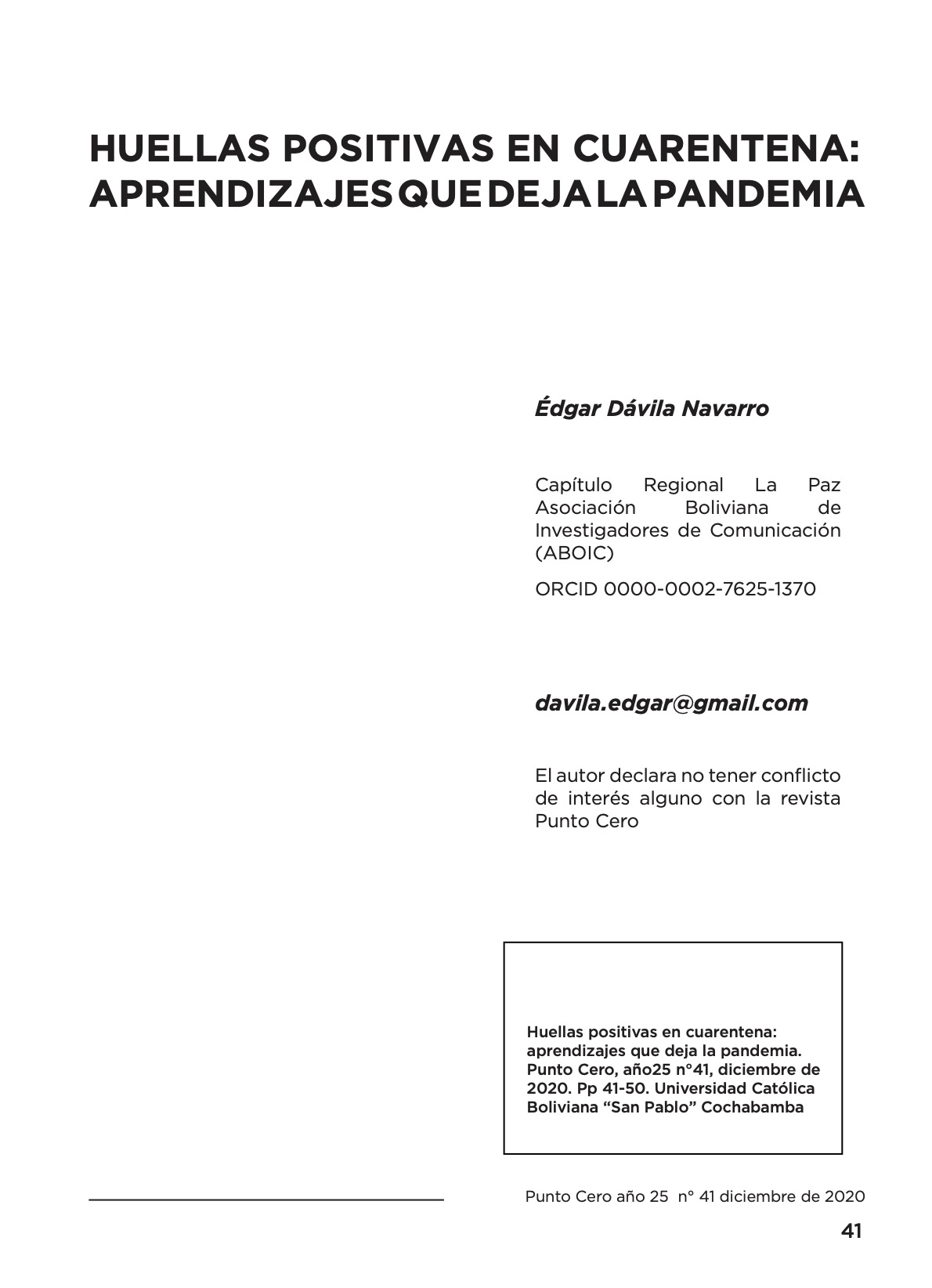Positive marks in quarantine: learning from the pandemic
DOI:
https://doi.org/10.35319/puntocero.2020216Keywords:
Solidarity, Positive Learning, Quarantine, PandemicAbstract
The research investigates the need to build spaces for dialogue, to learn about the lessons learned from the Pandemic in La Paz, through the testimony of people who belong to different solidarity initiatives, who acted throughout the quarantine (March - September). The study highlights the importance of solidarity as an essential human value, which represents the feeling that people have of collaborating with others (Páez, 2013) and distinguishes communication as an essential component in the construction of learning and in the processes transformation (Prieto, 1999). The research is descriptive; Its approach is qualitative, based on 4 in-depth interviews with those responsible for experiences that were organized in quarantine to help vulnerable social sectors. The results show affirmations about how human values can generate transformations in crisis situations, such as the Pandemic: “Solidarity implies a commitment, which allows us to see everyone as our neighbor”, Pablo Osorio. “The Pandemic has taught us that there are good people, people without resources, but they support with what little they have. There are no excuses to make a better world”, Jilmar Poma. Experiences that, through stories, leave lessons learned: “My learning is to see how very good people come out to face the virus; they are heroes without a cape, because they dedicate themselves to helping people in a selfless way”, Brayan, Antezana. “Fear has been a very strong feeling. It has taught us to learn to live far from people and to see them on screens. We learned to live and love them at a distance”. Fabricio Uscaymanta. They were stories that evidenced contributions to serve others.
References
APARICI, R. (2010). Educomunicación: más allá del 2.0. Gedisa, Barcelona.
ARANCIBIA, L. (2002). La sensibilización y la educación para la solidaridad. Madrid, España. Centro de Estudios Ramón Areces.
ARANGUREN, L. (2009). Cuando la solidaridad se hace mapa. En: L.,
Aranguren,M., Ardanaz,C., GarcíaRincón,A., López,F., Mejia& L., Medina. Iniciativas en red, de la teoría a la práctica, Educación, participación y competencias básicas en el trabajo con jóvenes y educadores. Fundación Jóvenes y Desarrollo.
BUXARRAIS, M. (1998). Educar para la solidaridad. Organización de Estados Iberoamericanos, en: http://www.oei.es/valores2/boletin8.htm.
CABARRÚS, C. (2003). La espiritualidad ignaciana es laical. Apuntes ignacianos. Guatemala.
Universidad Rafael Landívar. Decreto Supremo 4196. (2020). Gobierno del Estado Plurinacional de Bolivia. Gaceta Oficial.
Decreto Supremo N°4199. (2020). Gobierno del Estado Plurinacional de Bolivia. Gaceta Oficial.
Decreto Supremo 4214. (2020). Gobierno del Estado Plurinacional de Bolivia. Gaceta Oficial.
Decreto Supremo 4229. (2020). Gobierno del Estado Plurinacional de Bolivia. Gaceta Oficial.
Decreto Supremo 4245. (2020). Gobierno del Estado Plurinacional de Bolivia. Gaceta Oficial.
Decreto Supremo 4276. (2020). Gobierno del Estado Plurinacional de Bolivia. Gaceta Oficial.
Decreto Supremo 4314. (2020). Gobierno del Estado Plurinacional de Bolivia. Gaceta Oficial.
FREIRE, P (1985). Pedagogía del oprimido. México. Siglo XXI.
FREIRE, P. (1988). Pedagogía de la autonomía. México. Siglo XXI.
GUTIÉRREZ, F. Y PRIETO, D. (1994). La mediación pedagógica para sectores populares. San José de Costa Rica. RNTC.
Ministerio de Salud. (2020). Informe epidemiológico. Bolivia. Ministerio de Salud.
OMS. (2020) Poblaciones vulnerables en Pandemia. España. OMS.
ORTEGA, P. (1996). Valores y educación. Barcelona: Ariel.
PÁEZ, M. (2013). Acercamiento teórico al concepto de solidaridad. Realitas. Revista de Ciencias Sociales, Humanas y Artes. (1), 42-50.
PRIETO, D. (1999). La comunicación en la educación. Buenos Aires, Argentina. La Crujía.
RAE. (2016). Diccionario de la lengua española. Madrid, España. RAE.

Downloads
Published
How to Cite
Issue
Section
License
Copyright (c) 2020 Revista Punto Cero

This work is licensed under a Creative Commons Attribution-NonCommercial 4.0 International License.








